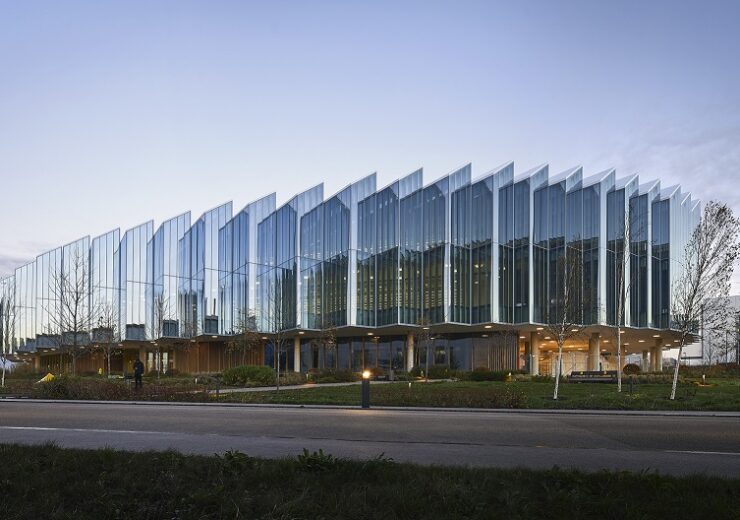The Phase 3 study, which enrolled 682 patients with early-stage (IB, II and IIIA) epidermal growth factor receptor-mutated (EGFRm) NSCLC, Tagrisso showed a statistically significant and clinically meaningful improvement, compared to placebo

AstraZeneca’s The Discovery Centre (DISC) Exterior. (Credit: AstraZeneca)
AstraZeneca has unveiled positive results for its cancer drug Tagrisso (osimertinib) in treating a type of non-small cell lung cancer (NSCLC) from the Phase 3 ADAURA trial.
The Phase 3 study enrolled 682 patients with early-stage (IB, II and IIIA) epidermal growth factor receptor-mutated (EGFRm) NSCLC, after complete tumour resection with curative intent.
In the clinical trial, Tagrisso showed a statistically significant and clinically meaningful improvement in overall survival (OS), compared to placebo.
The drug reduced the risk of death by 51% compared to placebo in both the primary analysis population (Stages II-IIIA), and in the overall trial population (Stages IB-IIIA).
In the primary analysis population, around 85% of patients treated with Tagrisso were alive at five years compared to 73% on placebo.
In the overall trial population, 88% of patients treated with Tagrisso were alive at five years compared to 78% on placebo, said the British drugmaker.
AstraZeneca oncology R&D executive vice president Susan Galbraith said: “Tagrisso cut the risk of death by more than half in the adjuvant setting, further establishing this transformative medicine as the backbone treatment for EGFR-mutated lung cancer.
“These results emphasise the importance of diagnosing patients with lung cancer early, testing for EGFR mutations and treating all those with an EGFR mutation with Tagrisso.”
Phase 3 ADAURA trial principal investigator Roy Herbst said: “These highly anticipated overall survival results, with 88% of patients alive at five years, are a momentous achievement in the treatment of early-stage EGFR-mutated lung cancer.”
In a separate development, AstraZeneca announced positive results for a combination of Lynparza (olaparib), Imfinzi (durvalumab), chemotherapy and bevacizumab, from an interim analysis of the Phase 3 DUO-O trial.
The Phase 3 clinical trial evaluated the efficacy and safety of the combination treatment in newly diagnosed patients with advanced ovarian cancer without tumour BRCA mutations.
In the study, patients were treated with Imfinzi plus platinum-based chemotherapy and bevacizumab followed by Imfinzi, Lynparza and bevacizumab as maintenance therapy.
According to the data, the combination resulted in a statistically significant and clinically meaningful improvement in progression-free survival (PFS) compared to chemotherapy plus bevacizumab (control arm).
Phase 3 DUO-O trial principal investigator Philipp Harter said: “The primary aim of first-line treatment of patients with advanced ovarian cancer is long-term control over the disease, but still too many patients progress quickly and face poor clinical outcomes today.
“Data from the DUO-O trial interim progression-free survival analysis provide evidence for further improvement with olaparib and durvalumab combination versus chemotherapy and bevacizumab alone in patients without tumour BRCA mutations.”
Susan Galbraith said: “The DUO-O trial demonstrates the potential of combining PARP inhibition with immunotherapy and we look forward to seeing more mature data and key secondary endpoints results.”
